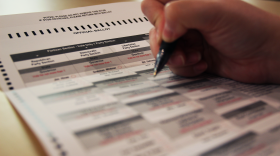Political parties usually love to get voters to switch to their side, but sometimes they’d just as soon have them stay put.
Primaries can be a time of political tricks by party loyalists who switch their stripes for a day in order to influence the other party's results.
Zach Gorchow, executive editor & publisher of Gongwer News Service, joined Michigan Radio Morning Edition host Doug Tribou to talk about the strategy and how it has played out in past Michigan primaries.
Here are some highlights from the interview (which you can hear in its entirety above):
Michigan's primary is a "closed" primary
"[T]o participate in either the Democratic or Republican presidential primary, [you] will have to ask for the ballot for one of those parties," Gorchow said. "The data on who participated in each presidential primary will be made available to the political parties, and that might mean you're going to get messaging from one of those political parties because they think you're one of them."
The strategy behind switching
"Let's talk in a 2020 context. So, maybe you're a Republican. You know that Donald Trump is going to be the Republican nominee," Gorchow said. "Let's say you decide [Bernie] Sanders would be the easier Democrat to defeat and you're going to vote for Bernie Sanders with the hope that perhaps there's enough Republicans out there who might just be able to tip the scales and get Sanders to a victory in Michigan that helps get him the nomination."
History of "Operation Chaos"
Gorchow says there have been at least three Michigan primaries where there were strong hints of party-switching.
- 1972: Segregationist George Wallace won the Democratic presidential primary in Michigan. "There was a lot of discussion that Republicans crossed over – Richard Nixon had no opposition for the Republican nomination that year – to vote for Wallace. And there were Democrats who voted for [Wallace], too. But there was a lot of discussion about Republican crossover then, and it led to Democrats getting rid of a primary for a long time. They went to a caucus system because they were so embarrassed."
- 2000: In the Republican primary, John McCain defeated George W. Bush. "The entire Republican establishment in Michigan was behind George W. Bush. Now, the question is how much of that was strategic and how much of it was legitimate interest in McCain? That's never really been known."
- 2012: "Mitt Romney versus Rick Santorum. President Obama had no opposition. While Mitt Romney did come away with a narrow win in Michigan, there were some pretty high-profile instances of Democrats helping Rick Santorum that year."
Chances of party switching on March 10
"Right now, there doesn't seem to be a whole lot of discussion about what sometimes is amusingly termed 'Operation Chaos,'" Gorchow said. "There's one state rep from the Upper Peninsula who's said that he's going to vote for Sanders. But you don't hear much about this."
"One thing we've seen from the Republicans is they are making a big point that Trump's vote totals in the states that have voted so far have far surpassed those of previous presidents running for reelection with no opposition in the primary. It's basically to say, 'Hey, look, our voters are really jazzed about voting for President Trump.' So it just doesn't seem like there's a concerted effort to try to meddle right now."
Editors note: answers have been edited for length and clarity.






